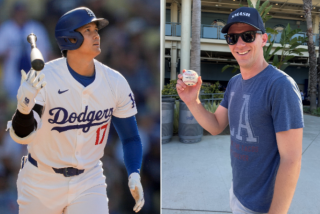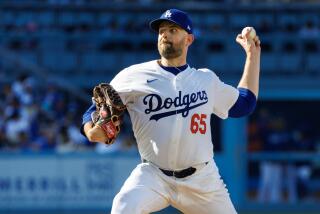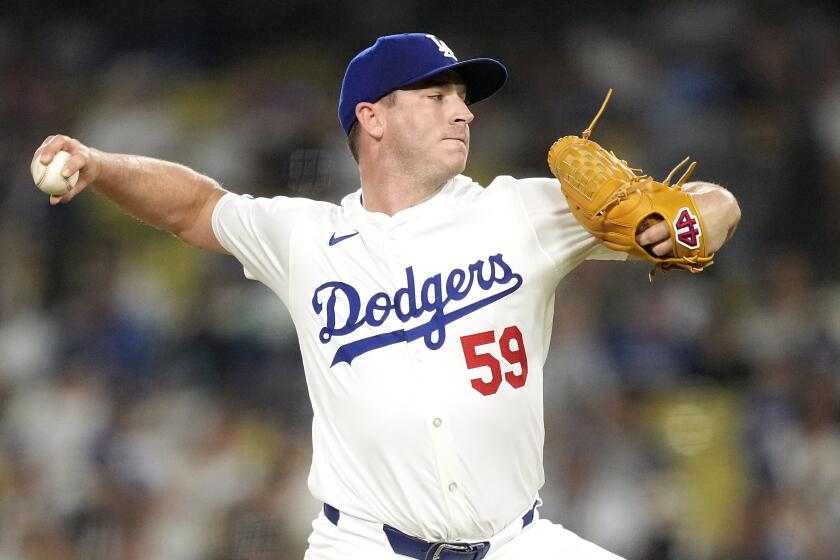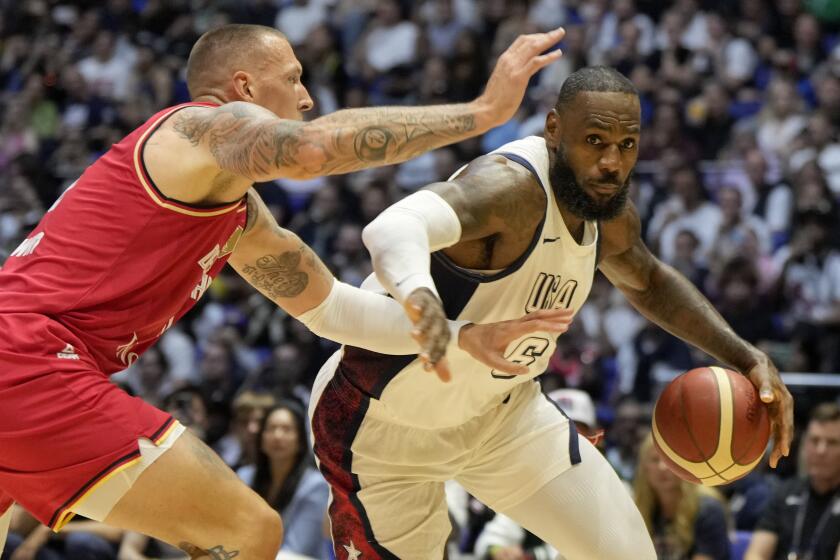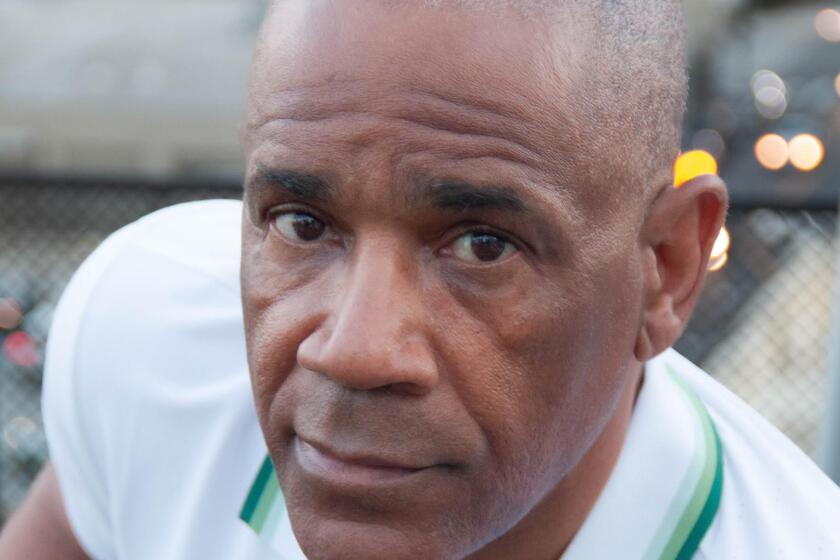REMEMBERING : DOYLE NAVE : Passage of Time Doesn’t Diminish Rose Bowl Heroics
Doyle Nave maintains that if everybody who has since claimed to be in attendance at the 1939 Rose Bowl game had actually been there, the crowd would have been about 500,000.
It’s understandable for people to want to be identified with an event of historic proportion--and time hasn’t dulled the luster of that memorable game.
In this centennial celebration of USC football, this is the 50th anniversary of the season at the end of which the Trojans played Duke in the Rose Bowl.
Nave, 73 and living in Burbank, is remembered as the fourth-string USC quarterback who came off the bench late in the fourth quarter and threw 4 consecutive passes to an end with the catchy name of Antelope Al Krueger.
The last pass went to Krueger for a touchdown and a 7-3 victory with about 40 seconds remaining, spoiling Duke’s perfect season.
The Blue Devils had been unbeaten, untied and unscored upon.
How Nave even got into the game is a story in itself, one in which the details have been changed, or embellished through the years.
Even though he played only 28 1/2 minutes during the regular season, his place in college football history was secured in perhaps the most dramatic finish of all the 74 Rose Bowl games played.
In 1938, USC was coached by the now-legendary Howard Jones, whose team had lost to Alabama in its opening game, 19-7, and was later defeated by Washington, 7-6.
The Trojans, however, beat California, 13-7, tying the Bears for the Pacific Coast Conference championship and earning the right to play in the Rose Bowl.
USC’s prestige was further enhanced in the last regular-season game, a 13-0 victory over previously unbeaten Notre Dame that deprived the Irish of a national championship.
At that time, the West Coast representative in the Rose Bowl selected its opponent, and there was considerable pressure on USC to invite unbeaten Texas Christian.
The Horned Frogs and their supporters blatantly campaigned for the invitation, and one prominent Texan even sent turkeys as Thanksgiving Day presents to Los Angeles sportswriters.
TCU, led by Davey O’Brien, the Heisman Trophy-winning quarterback, was indeed a worthy opponent. But USC officials were indignant that TCU had so brazenly sought the bid.
So, resisting pressure, USC invited Duke, a team that Dick Hyland, then a Times sports columnist, characterized as “unbeaten, untied, unscored upon and uninteresting.”
The Blue Devils featured halfback Eric Tipton, an outstanding punter who relied on his specialty on first down in his own territory. In a word, Duke was dull. However, the Wallace Wade-coached team had an impregnable defense.
That was evident as Duke repulsed every USC scoring threat and eventually took the lead, 3-0, on Tony Ruffa’s field goal early in the fourth quarter.
Then, USC, led by quarterback Grenny Lansdell, drove to the Duke 34-yard line.
Joe Wilensky, a USC assistant coach, was operating a phone from the bench at the time and relaying messages from senior assistants in the press box.
Wilensky was overheard in animated conversation with Sam Barry, who was in the press box, saying, “OK, Sam, OK.”
Nick Pappas, now a development consultant in the USC athletic department and an assistant freshman coach at the time, said he was told by Wilensky that Barry wanted Nave to go into the game.
Pappas said he passed the message to Jones. Nave picks up the story from there.
“I was sitting about three seats from Jones on the bench, and he said to me, ‘Doyle, I’m thinking about putting you in.’
“ ‘What have you got in mind?’ I said.
“ ‘The 27 series. Get the ball to Krueger. He’s the best end we have for getting open.’ ”
So Nave went into the game with about 2 minutes left, and USC was penalized 5 yards for excessive timeouts.
So, it was first and 15 from the Duke 39-yard line:
Nave: “I got in the huddle and said, ’27 deep.’ I threw to Al, and we got 13 yards.”
Second and 2 at the 26:
“I told Al, ‘Run 27 out, go as far as you can, then head for the sideline, a button hook.’ The pass was completed for 9 yards and a first down.”
First down at the Duke 17:
“Now we had lousy field position because we were near the sideline and Al was the left end, or short-side end.
“I called 27 end around. Al would come across the middle to the right side. It worked, but we lost 2 yards.”
Second and 12 at the Duke 19:
“Now there were about 40 seconds remaining,” Nave said. “I told Al, ‘You’ve got to get into the end zone. Do all the faking you want because our guys are doing a great job of blocking.
“ ‘When you make a move, I want you to go to the corner of the end zone. Don’t change direction. By the time you get there, I’ll have the ball to you.’
“I saw Al make a fake out and a fake in, and he got Tipton to turn his back to him. I had faded back to about the 31- or 32-yard line and, as soon as he made his move, I threw that damn thing as hard as I could right into the corner, and he was there.”
After Krueger had scored, Pappas noticed that the assistant coaches, who were supposed to be in the press box, were on the sideline.
“I looked at Wilensky and said, ‘Joe, you faked that phone call,’ ” Pappas said. “He said, ‘Yeah.’ I told him, ‘Don’t tell anyone.’ We were both in law school at the time, and I thought we’d get into trouble.”
Pappas didn’t tell anyone for 10 years, finally revealing the intrigue to Maxwell Stiles, a Los Angeles sportswriter.
There was another twist to the game. Braven Dyer, a Times sports columnist, who covered the Trojans, had editorially urged Jones all season to “give my boy Doyle Nave a chance.”
However, Dyer had to leave the game to get to the paper before Nave came off the bench. He heard about “his boy’s” heroics on his car radio.
Nave said that he and Krueger were carried off the field by their teammates, and in the ensuing bedlam, it took him awhile to get to the dressing room.
“When I got there, Wallace Wade came through, and someone made a remark that he shouldn’t have made, saying, ‘Would you like to shake the hand of the guy who beat you?’ ” Nave recalled. “I thought at the time it was a terrible thing to say. Wade just said, ‘I came to the dressing room to shake the hand of Howard Jones’, and he left.”
Sportswriters seized on the apparent snub and criticized Wade in postgame stories.
Nave said that Wade was being unjustly criticized and wrote a letter to the coach to that effect later, receiving a gracious reply.
The previously obscure quarterback was now famous and, as a bonus for his performance, was awarded a letter by the USC athletic department even though he didn’t have enough playing time to merit one.
Nave, a junior at the time, played another season. Krueger, a sophomore, caught a touchdown pass in the 1940 Rose Bowl game from quarterback Ambrose Schindler as USC beat Tennessee, 14-0.
In those days, the quarterback was actually a tailback in Jones’ single wing.
Krueger, 69, grew up in Antelope Valley, and his nickname, Antelope Al, has endured. He still lives in Lancaster.
Asked to give his account of the game, Krueger was prepared. He has written a synopsis of the events that transpired on Jan. 1, 1939, and shared it with a reporter.
“It was something more than another game, it was a legend,” said Krueger, reading from his script. “It was like David slaying Goliath, the British Navy destroying the Spanish fleet, Davy Crockett at the Alamo . . . Jones told the boys in the locker room, ‘We’ve never lost a Rose Bowl game and, by God, we never will . . . “
Krueger’s prose rolled on, his account of the game substantially the same as Nave’s.
When Krueger left USC after the 1940 season, he played for the Washington Redskins for 2 years, then became a flight instructor in the Navy, returning to pro football briefly after World War II as an end with the Los Angeles Dons of the All-America Conference.
“I caught touchdown passes from Sammy Baugh when I was with the Redskins,” Krueger said. “But there was no one better than Doyle Nave, not even Sammy Baugh.”
Nave, as a Navy officer, was stationed aboard an aircraft carrier in the South Pacific during World War II.
He had a reunion with another officer on an adjoining carrier--Dan Hill, the center on the Duke Rose Bowl team.
“I asked Dan whether he had any idea that I was going to pass when I came into the game,” Nave said. “He said, ‘Hell, no. We didn’t even know who you were.’ ”
More to Read
Go beyond the scoreboard
Get the latest on L.A.'s teams in the daily Sports Report newsletter.
You may occasionally receive promotional content from the Los Angeles Times.
